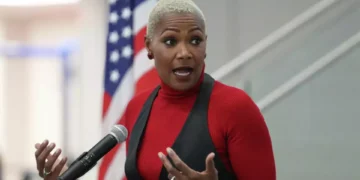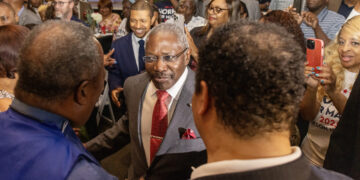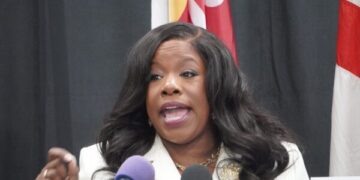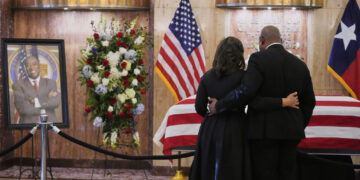Nov 4, 2024 Story by: Editor
As the presidential election approaches, experts on disinformation are raising concerns about the growing spread of fake images, which could distort public perceptions of key voting groups—particularly Black men.
“We’re seeing an increase in artificial intelligence-generated images that falsely suggest Black men support Donald Trump, when in fact those images are entirely fabricated,” said Alphonso David, President and CEO of the Global Black Economic Forum. He was referring to AI-generated images that depict former President Trump alongside Black men. “We have to be very, very cautious about the origins of these narratives,” David added. “What we’re seeing is a lot of misinformation about the political views or inclinations of Black men when it comes to voting.”
As AI-generated images continue to flood social media, community leaders are warning that even fake photos can have a significant impact. “It’s not just the fake photos,” said Cliff Albright, founder of the Black Voters Matter Fund. “It’s fake information. It’s fake narratives.”
This narrative that Trump is the favored candidate among Black men has been circulating for over a year, especially through AI-generated images shared on platforms like X. In January, Republican pollster Patrick Ruffini posted an AI-created image of Black men canvassing for the GOP, with the caption, “Republican victory in 2024 depends on their being able to do this.” Similar images, many showing Trump surrounded by Black men, were shared in the months before President Joe Biden ended his re-election bid and Vice President Kamala Harris entered the race.
However, polling data contradicts these narratives. A poll from The New York Times and Siena College in October shows that 70% of likely Black male voters plan to vote for Harris, while only 20% intend to vote for Trump. A recent poll from Howard University also indicates that the “overwhelming majority of Black voters” in swing states favor Harris.
Despite increased Black voter support following Biden’s withdrawal and Harris’s entry into the race, Trump has seen some gains among Black male voters, particularly as his appeal grows with younger male voters in general. According to the Times-Siena poll, 15% of Black male voters say they plan to vote for Trump this year, marking a six-point increase from 2020.
As the race remains tight and candidates focus on key voter groups, the Harris campaign and the Democratic Party have ramped up outreach to Black male voters. Recently, the Harris campaign released an “Opportunity Agenda for Black Men,” a platform that includes support for small business loans, job training, and the legalization of recreational marijuana. Additionally, the campaign unveiled a new ad narrated by a Black man. “Let’s be honest and get a reality check,” the ad’s narrator states. “Women know how to make things happen.”
Former President Barack Obama also addressed the narrative that Black men might not support Harris due to her gender. “Part of it makes me think that, well you just aren’t feeling the idea of having a woman as president,” Obama said during a campaign stop in Pittsburgh, Pennsylvania. “And you’re coming up with other alternatives and reasons for that.”
In a virtual roundtable hosted by the Win With Black Men PAC, Obama praised Black men for their involvement in educating and mobilizing voters. “It’s also a testament to the fact there are a lot of brothers that are out there who want to get involved. And if given the opportunity and given a direction, are ready to roll up their sleeves and make things happen,” he said.
Vice President Harris has also sought to engage with Black men directly through Black media platforms. “Black men are no different from anybody else. They expect that you have to earn their vote,” she said in an interview with The Shade Room.
Nevertheless, community leaders continue to stress that the prevailing narratives about Black male voters and their candidate preferences are often misleading or entirely false. Disinformation expert Esosa Osa, founder of Onyx Impact, noted that false claims about Black men’s reluctance to vote for a woman are likely being intentionally spread. “There are folks in some of these Black online spaces who are seeking to divide, who are profiting off the division of the Black community,” she told Scripps News.
Osa explained that such divisive narratives are “preying on existing distrust.” “The more doubt and distrust you place in the process, in various communities, the less power that community will have. And the more fear and distrust that community will have,” she added.
Cliff Albright argued that those promoting disinformation about Black male voters are employing a “cynical strategy” to confuse and discourage Black voter turnout. “They’re not even really trying to win Black voters,” he said. “What they are trying to do is to get Black voters to stay at home. It’s a very cynical strategy. It’s a very anti-Black strategy to try to get us to just lean into our grievances, to lean into frustrations.”
Although many of the images showing Trump with Black men are clearly AI-generated, Albright emphasized that these fake images are not intended to convince people they are real. Instead, he explained, their purpose is to leave a misleading, though persistent, impression about Black male voters. “There is this notion that Black men are ripe for the taking. That if you send enough negative information, enough information suggesting a Black woman shouldn’t lead, enough misogyny, you might get a certain segment of Black men to sit on the sidelines,” Albright said. “Sitting on the sidelines, just being upset and not wanting to participate,” he added. Source: SCRIPPS NEWS

















